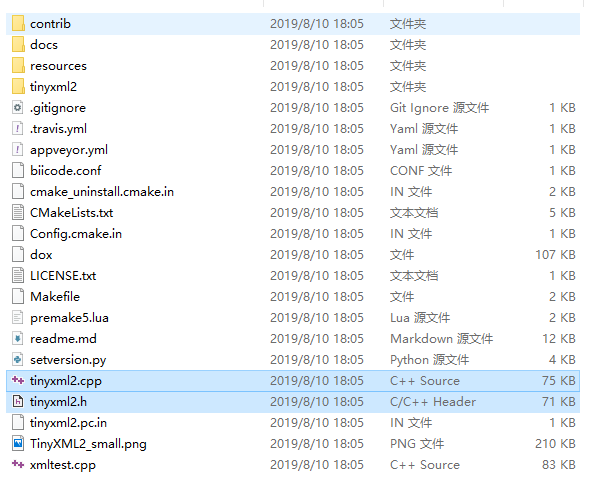编程杂谈——TinyXML2的快速实践
最近遇到个需要在C++中处理XML文件的需求,虽然对此方面并不是很熟,但好在有GitHub上的awesome-cpp项目的帮助,还是收获了足够的相关知识。
类库
常用的或被推荐的XML类库有以下数个选项,不过相较于纯C完成的类库个人还是更倾向于C++的类库:
- Boost.PropertyTree - A property tree parser/generator that can be used to parse XML/JSON/INI/Info files. [Boost]
- Expat - An XML parser library written in C. [MIT]
- Libxml2 - The XML C parser and toolkit of Gnome. [MIT]
- libxml++ - An XML Parser for C++. [LGPL2]
- Mini-XML - A small XML parsing library written in ANSI C. [LGPL2 with exceptions]
- PugiXML - A light-weight, simple and fast XML parser for C++ with XPath support. [MIT]
- RapidXml - An attempt to create the fastest XML parser possible, while retaining useability, portability and reasonable W3C compatibility. [Boost]
- TinyXML - A simple, small, minimal, C++ XML parser that can be easily integrating into other programs. [zlib]
- TinyXML2 - A simple, small, efficient, C++ XML parser that can be easily integrating into other programs. [zlib]
- TinyXML++ - A completely new interface to TinyXML that uses MANY of the C++ strengths. Templates, exceptions, and much better error handling. [MIT]
- Xerces-C++ - A validating XML parser written in a portable subset of C++. [Apache2]
TinyXML VS TinyXML2
TinyXML是在寻找更多信息时被多次提及的,因为并不想花费过多时间在做选择题上,于是其似乎成了最终的赢家。
但未曾想它自身还有两个版本。
TinyXML与TinyXML2的相同点:
- 简单的API
- 基于DOM的解析器
- 支持UTF-8 Unicode
TinyXML2的优点:
- 着眼于未来的开发
- 更少的内存分配(1/10到1/100),使用更少的内存(TinyXML的40%),更快(读取上约5倍)
- 不再需要STL
- 更现代的C++,包括一个合适的命名空间
- 适当且有用地处理空白
TinyXML的优点:
- 能够报告解析错误的位置
- 支持一些C++ STL约定:流与字符串
- 非常成熟并且调试良好的代码库
TinyXML2的第2及第4项优点是我更中意的,所以还是选它吧。
使用方法
在其GitHub的仓库中下载相关文件,tinyxml2

找到tinyxml2.h与tinyxml2.cpp两个文件,将它们添加至你的工程项目中,这便是所有需要的。
示例
#include <iostream>
#include <random>
#include "tinyxml2.h"
using namespace tinyxml2;
void writeXMLFile()
{
XMLDocument doc;
auto delaration = doc.NewDeclaration();
doc.InsertFirstChild(delaration);
auto root = doc.NewElement("root");
doc.InsertEndChild(root);
auto id = doc.NewElement("id");
id->SetText(666);
root->InsertEndChild(id);
auto name = doc.NewElement("name");
name->SetText("Ken");
name->SetAttribute("blogger", true);
root->InsertEndChild(name);
doc.SaveFile("sample.xml");
}
XMLDocument* readXMLFile()
{
auto doc = new XMLDocument;
doc->LoadFile("sample.xml");
auto root = doc->RootElement();
auto id = root->FirstChildElement("id");
std::cout << id->GetText() << std::endl;
auto name = root->FirstChildElement("name");
std::cout << name->GetText() << std::endl;
std::cout << name->Attribute("blogger") << std::endl;
return doc;
}
int main()
{
writeXMLFile();
auto doc = readXMLFile();
auto root = doc->RootElement();
auto id = root->FirstChildElement("id");
doc->DeleteNode(id);
auto randomid = doc->NewElement("randomid");
std::default_random_engine e;
std::uniform_int_distribution<int> u;
auto r = u(e, decltype(u)::param_type(1000000, 9000000));
randomid->SetText(r);
root->InsertFirstChild(randomid);
doc->Print();
delete doc;
}
作者:Ken.W
出处:http://www.cnblogs.com/kenwoo
本文版权归作者和博客园共有,欢迎转载,但必须给出原文链接,并保留此段声明,否则保留追究法律责任的权利。
出处:http://www.cnblogs.com/kenwoo
本文版权归作者和博客园共有,欢迎转载,但必须给出原文链接,并保留此段声明,否则保留追究法律责任的权利。



 浙公网安备 33010602011771号
浙公网安备 33010602011771号